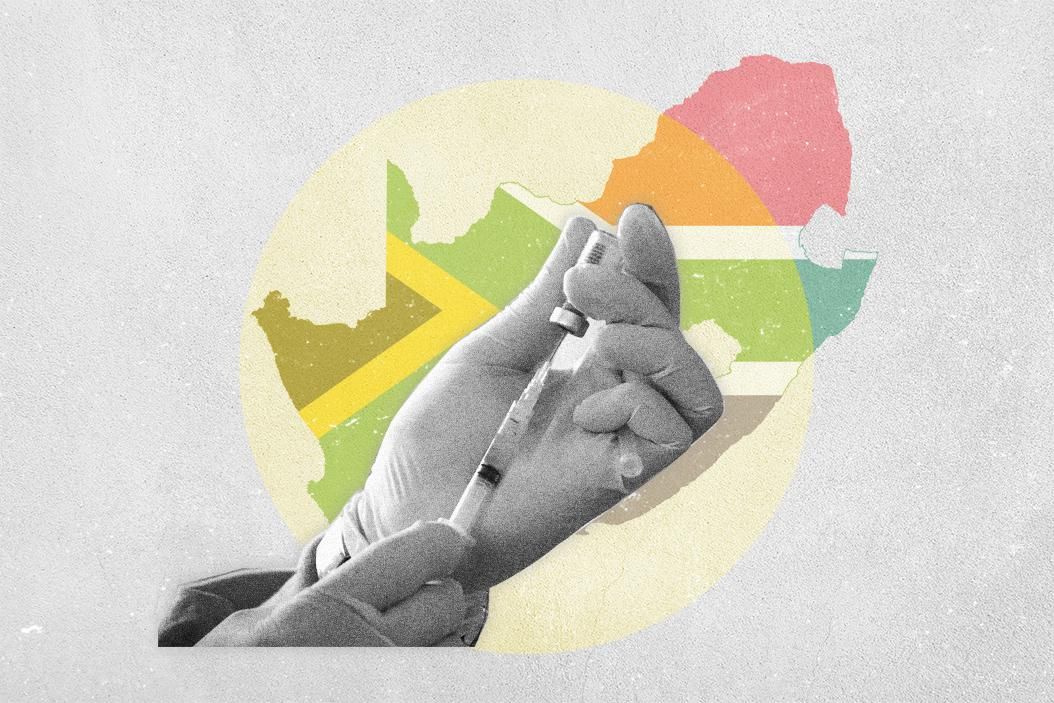October 27, 2021
Less than a year after the world started putting COVID vaccines into people's arms, most regions have immunized at least half their populations, but Africa still lags behind. With industrialized nations hoarding jabs and the COVAX facility faltering, barely five percent of the African population is fully vaccinated.
Some enterprising South African scientists are now making a bold bid to change that, with an experiment that could benefit not only Africa's 54 nations and billion people, but the entire world: Afrigen Biologics and Vaccines, a Cape Town-based startup, has developed a plan to reverse-engineer Moderna's mRNA shot and manufacture it for priority distribution on the continent.
How are they going to do it? The ingredients in Moderna's vaccine "recipe" are mostly publicly available — the trick is to figure out what to do with them. It's like having all the ingredients and measurements to bake a cake, but only vague instructions for each step.
Given that the Moderna vaccine was developed with US taxpayer money, lawyers are still figuring out which aspects of the process belong solely to the company. But that may be moot for now: the company says it won't sue, leaving Afrigen apparently in the clear to go ahead.
Cloning an mRNA vaccine would be a huge win for South Africa. It would be the equivalent of the moon landing in terms of accomplishment and prestige for a nation that too often grabs headlines for all the wrong reasons. Moreover, the project is backed and funded by the World Health Organization, so if the code is cracked, the formula would be made available to all as a public good across the whole continent and the wider developing world.
A highly effective yet affordable jab that can be manufactured anywhere could be a game-changer to stop more contagious COVID variants from emerging where the population is still unvaccinated. What's more, the sky's the limit when it comes to mRNA's potential to create vaccines against other diseases endemic to Africa such as Ebola, less infectious but way deadlier than COVID.
But don't get too excited just yet. The startup says it'll take up to a year to reverse-engineer Moderna's jab. Also, getting the formula right is only one piece of the puzzle. Afrigen would then need to figure out how to mass-produce, store, and deliver the vaccine around a continent with often poor infrastructure, not to mention getting raw materials at a moment when global supply chains are already stretched thin.
There's a political angle too. In the US, the Biden administration wants Moderna to sell more vaccines to COVAX at cost, and is facing growing criticism for treating the company with kid gloves after ignoring Biden's call to boost production for low-income countries despite Uncle Sam being Moderna's research sugar daddy.
Meanwhile, public health advocates are urging the National Institutes of Health to force Moderna to give up its secret sauce, and calling out the US government for paying lip service to waiving patents and global vaccine equity while not pushing the drugmakers harder to share their tech or prioritize supply for countries with low vaccination rates.
Technically, the Biden administration has some leverage because the White House bankrolled Moderna's vaccine research through the NIH and Operation Warp Speed. But twisting Moderna's arm would be a hard sell for the US government, traditionally reticent to meddle with Big Pharma and with little to gain (politically at home) from vaccinating other countries.
Moderna, for its part, says that right now it's better for the company to expand production itself than to share its tech because scaling up production in Africa will take too long. More broadly, it's also playing a longer game of aiming to dominate the post-COVID mRNA manufacturing landscape along with Pfizer.
No one knows if reverse-engineering mRNA COVID vaccines will work, but then again no one's tried before. Still, the upshot is that there's a huge opportunity despite uncertainty about the science, the business of producing the jab, and the politics behind it all.
From Your Site Articles
More For You
Bad Bunny during the Super Bowl LX halftime show press conference at Moscone Center.
Kirby Lee-Imagn Images
100 million: The number of people expected to watch the Super Bowl halftime performance with Bad Bunny, the Puerto Rican superstar and newly minted Album of the Year winner at the Grammys.
Most Popular
Think you know what's going on around the world? Here's your chance to prove it.
- YouTube
An imminent US airstrike on iran is not only possible, it's probable.
Americans are moving less — and renting more. Cooling migration and rising vacancy rates, especially across the Sunbelt, have flattened rent growth and given renters new leverage. For many lower-income households, that relief is beginning to show up in discretionary spending. Explore what's changing in US housing by subscribing to Bank of America Institute.
© 2025 GZERO Media. All Rights Reserved | A Eurasia Group media company.
